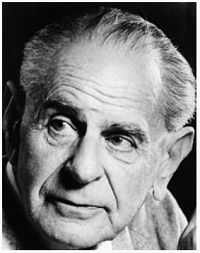That Karl Popper was a man who lived by convictions is shown by his views on God, that agnosticism was the most justifiable position because belief in God was irrational. As he explains in Conjectures and Refutations, an irrational – or "metaphysical" – statement may well be true, it just can’t be treated as scientific because there is no prospect of testing it.
Popper considers selected philosophers to show that unless you try to understand the central problems motivating people’s search for truth you end up with doxography, or a list of the opinions they held. (This was brought into focus recently when Norman Tebbit demanded proof the English Defence League was "far-right", complaining all he’d been given was lists of people who’d expressed that opinion.)
Having fled Vienna to escape Naziism guarantees he’s anti-fascist, but one can see in his political philosophy throughout these essays that fascism is not a matter of which side of a political seesaw one inhabits, but rather is synonymous with tyranny, that being a system of government unremovable by non-violent means.He opposes dialectic, which he sees as a misreading by both Fichte and Hegel, and therefore by Marx, of Kant’s triadic organisation of his categories. Kant’s problem was his rude awakening from dogmatic slumber by the philosophy of David Hume, his response trying to identify how moral action is possible in a world in which reality, as things-in-themselves, is denied to our sense perception and therefore to our understanding.
But the main target of his politely-expressed ire is Wittgenstein, whose assertion that problems in philosophy boiled down to misunderstandings of language threatened to destroy the links that have always existed between advances in philosophical thought and scientific (and political) progress. And, as this collection of essays shows again and again, progress towards a free society is what powered Popper.
Gerry Dorrian
300 words


No comments:
Post a Comment